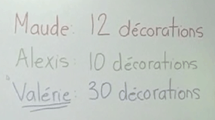Abstract
Using simple word problems, we analyze possible teacher conceptions on the process of problem solving, its goals and the choices that a problem solver can make in problem mathematization. We identify several possible teacher conceptions that would be responsible for the different didactical contracts that teachers create in the mathematics class. Using especially chosen and designed task examples, we demonstrate the diagnosis of teacher own controls in solving problems and in evaluating problem solutions. We also discuss characteristics of task examples that might promote a shift from a problem solving perspective to a modeling perspective that goes beyond merely accepting alternative solutions due to realistic considerations. This shift in perspective would be exhibited through a new understanding of the process of fitting mathematical models in problem situations.
Similar content being viewed by others
Notes
To use one of our reviewer’s terms, the three answers could represent a “socialist”, “almost socialist”, and “capitalist” approaches.
References
Balacheff, N. (2010). Bridging knowing and proving in mathematics: A didactical perspective. In G. Hanna, H. N. Jahnke, & H. Pulte (Eds.), Explanation and proof in mathematics: Philosophical and educational perspectives (pp. 115–136). New York: Springer.
Blum, V., & Niss, M. (1991). Applied mathematical problem solving, modelling, applications, and links to other subjects—State, trends and issues in mathematics instruction. Educational Studies in Mathematics, 22, 37–68.
Brousseau, G. (1997). Theory of didactical situations in mathematics. Dordrecht: Kluwer Academic Publishers.
DeFranco, T. C., & Curcio, F. R. (1997). A division problem with a remainder embedded across two contexts: Children’s solutions in restrictive versus real-word settings. Focus on Learning Problems in Mathematics, 19(2), 58–72.
Doerr, H. M., & English, L. D. (2006). Middle grade teachers’ learning through students’ engagement with modeling tasks. Journal of Mathematics Teacher Education, 9, 5–32.
Duval R. (1988). Ecarts sémantiques et coherence mathématiques: introduction aux problèmes de congruences. Annales de didactique et de sciencse cognitives (IREM de Strasbourg), 1, 7–23.
Ikeda, T., & Kaiser, G. (2005). The role and the relevance of applications and modelling in Japan and Germany—A comparative study. In Proceedings of the Third International ICMI East Asia Regional Conference on Mathematics Education, Shanghai, August 7–12.
IREM de Grenoble. (1980). Quel est l’âge du capitaine. Bulletin de l’APMEP, 59(323), 235–243.
Kaiser, G. (2006). The mathematical beliefs of teachers about applications and modelling—Results of an empirical study. In J. Novotna, H. Moraova, M. Kratka, & N. Stehlikova (Eds.), Proceedings of the 30th International Conference for the Psychology of Mathematics Education (Vol. 3, pp. 393–400).
Lesh, R., & Doerr, H. M. (2003). Foundations of a models and modelling perspective on mathematics teaching, learning, and problem solving. In R. Lesh & H. M. Doerr (Eds.), Beyond constructivism: A model and modelling perspective on teaching, learning, and problem solving in mathematics education (pp. 3–33). Mahwah, NJ: Lawrence Erlbaum.
Lesh, R., Hoover, M., Hole, B., Kelly, A., & Post, T. (2000). Principles for developing thought-revealing activities for students and teachers. In A. Kelly & R. A. Lesh (Eds.), Handbook of research design in mathematics and science education (pp. 591–645). Mahwah, NJ: Lawrence Erlbaum.
Nesher, P. (1980). The stereotyped nature of school word problems. For the Learning of Mathematics, 1(1), 41–48.
Norman, D. A. (1993). Things that make us smart. New York: Addison-Wesley Publishing Company.
Peled, I. (2010). (Fish) food for thought: Authority shifts in the interaction between mathematics and reality. Mathematics Education Research Journal, 22(2), 108–120.
Peled, I., & Bassan-Cincinatus, R. (2005). Degrees of freedom in modeling: Taking certainty out of proportion. In H. L. Chick & J. L. Vincent (Eds.), Proceedings of the 29th International Conference for the Psychology of Mathematics Education (Vol. 4, pp. 57–64).
Peled, I., & Hershkovitz, S. (2004). Evolving research of mathematics teacher educators: The case of non-standard issues in solving standard problems. Journal of Mathematics Teacher Education, 7(4), 299–327.
Reusser, K., & Stebler, R. (1997). Every word problem has a solution—The social rationality of mathematical modeling in schools. Learning and Instruction, 7(4), 309–327.
Schoenfeld, A. H. (1987). What’s all the fuss about metacognition? In A. H. Schoenfeld (Ed.), Cognitive science and mathematics education. Hillsdale, NJ: Erlbaum.
Verschaffel, L., & De Corte, E. (1997). Teaching realistic mathematical modeling and problem solving in the elementary school: A teaching experiment with fifth graders. Journal for Research in Mathematics Education, 28, 577–601.
Verschaffel, L., De Corte, E., & Borghart, L. (1997). Pre-service teachers’ conceptions and beliefs about the role of real-world knowledge in mathematical modeling of school word problems. Learning and Instruction, 7(4), 339–359.
Verschaffel, L., Greer, B., & De Corte, E. (2002). Everyday knowledge and mathematical modelling of school word problems. In K. Gravemeijer, R. Lehrer, B. van Oers, & L. Verschaffel (Eds.), Symbolizing, modelling and tool use in mathematics education (pp. 257–276). The Netherlands: Kluwer Academic Publishers.
Verschaffel, L., Van Dooren, W., Greer, B., & Mukhopadhyay, S. (2010). Reconceptualising word problems as exercises in mathematical modeling. Journal fur Mathematik Didaktik (ZDM), 31, 9–29.
Acknowledgments
This study was supported by a grant from the Israeli Science Foundation (59/06).
Author information
Authors and Affiliations
Corresponding author
Rights and permissions
About this article
Cite this article
Peled, I., Balacheff, N. Beyond realistic considerations: modeling conceptions and controls in task examples with simple word problems. ZDM Mathematics Education 43, 307–315 (2011). https://doi.org/10.1007/s11858-011-0310-0
Accepted:
Published:
Issue Date:
DOI: https://doi.org/10.1007/s11858-011-0310-0




